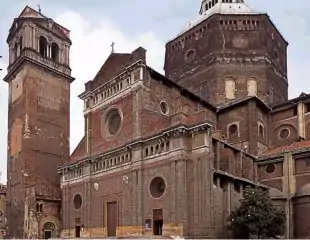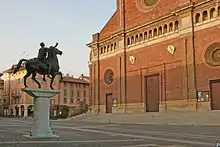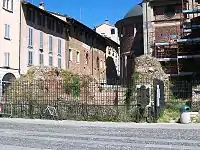Civic Tower (Pavia)
The Civic Tower was built in the Italian city of Pavia in the 11th century, next to Pavia Cathedral. Built to a rectangular footprint, it was 72 metres (236 feet) high.[1]

Between 1583 and 1585 the architect Pellegrino Tibaldi led works to add a room at the top of the tower to house the cathedral's bells, which it did until it was moved to a campanile of the Cathedral.[2]
On 17 March 1989, at 8:55 a.m., the Civic Tower collapsed, leaving 8,000 cubic metres (280,000 cubic feet) of brick, sand and granite rubble.[3] The collapse killed four people and injured fifteen.[4][5][6] It has not been rebuilt, though some elements from it are now on display at the city's Castello Visconteo.[2]
After the tower's collapse, the Italian government closed the Leaning Tower of Pisa on 7 January 1990 over concerns that the popular tourist site may also be at risk of collapse.[7][8]
 Remains of the tower (between the statue base and the corner of the Pavia Cathedral).
Remains of the tower (between the statue base and the corner of the Pavia Cathedral). Close-up of remains with a plaque showing its original form
Close-up of remains with a plaque showing its original form
References
- "Torre Civica (resti)" (in Italian). Lombardia Beni Culturali. Archived from the original on 20 November 2013. Retrieved 4 April 2013.
- Arecchi, Alberto (29 January 2002). "La Torre Civica" (in Italian). Miapavia.
- Bonerandi, Enrico (18 March 1989). "Un Boato E L' Antica Torre Si Sbriciola". La Repubblica (in Italian).
- Montanari, Laura (22 March 1989). "Ma Pavia Ha Ancora Paura". La Repubblica (in Italian).
- Hofman, Paul (1989-07-30). "Italy's Endangered Treasures". The New York Times. New York. Retrieved 2020-04-29.
- Montalbo, William D (1989-03-18). "900-Year-Old Bell Tower Collapses in Italy; Three Killed". Los Angeles Times. Los Angeles. Retrieved 2020-04-29.
- "Tipping the Balance". TIME Magazine. 25 June 2001.
- "BBC on this day: 1990: Leaning Tower of Pisa closed to public". BBC News. Retrieved 29 April 2020.